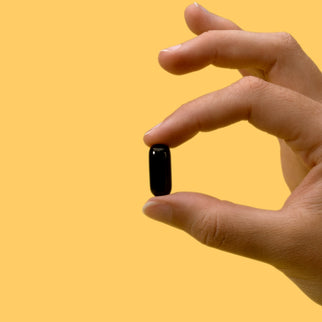Many of us have heard of the impressive potential benefits of omega-3, so we rush to find the perfect fish oil supplement or start to eat more fish. After all, we all want to see these benefits, like healthy skin and a healthy memory, as quickly as possible. But how long does it take to start seeing these benefits? Is consuming fish really the best way to see the quickest benefits?
By understanding how omega-3 absorption works and how long it takes, you can make the right decisions about how you choose to obtain this essential nutrient.
What Is Omega-3?

Omega-3s are healthy fats called polyunsaturated fatty acids. These fatty acids play several significant roles in the body, largely because they are an essential building block of cell membranes. As an important piece in cell membranes, omega-3s also have the ability to influence how cells in the body interact with each other, thus supporting several bodily systems and functions.
There are three main types of omega-3s that you are most likely to find in your body and in different foods, which are:
- Alpha-linolenic acid (ALA), a short-chain omega-3 precursor
- Docosahexaenoic acid (DHA)
- Eicosapentaenoic acid (EPA)
The two most valuable are DHA and EPA, as they provide possible health benefits by supporting several important bodily functions. Unlike ALA, DHA and EPA are not particularly easy to come by in a standard diet. Therefore, it is important to be mindful of how you include these two nutrients in your everyday diet.
What Are the Benefits of Consuming Omega-3s?
Routinely consuming these two omega-3s offers a wide variety of potential health benefits. For example, these fatty acids can help support your cardiovascular health and support healthy cognitive function. In addition, regular omega-3 intake may help you:
- Maintain a healthy blood pressure already within the normal range
- Support healthy joints
- Support emotional wellness
- Support your eye health
- Help maintain cholesterol and triglyceride levels already within the normal range
How Long Does Omega-3 Take To Work?
It is easy to get excited about the potential benefits of omega-3 fatty acids, but then the question becomes — how long does it take before you begin to see these benefits? Depending on the type of omega-3 that you take in, it can take some time to absorb and take even longer to start working. Here’s what you need to know.
How Long It Takes To Absorb
Once you first take omega-3, your body needs to absorb the nutrient. The amount of time it takes your body to fully absorb omega-3 can vary, but it depends largely on what the source of the nutrient is. With any source, your body begins to absorb omega-3 into the bloodstream within one to two hours of ingestion. Typically, krill and fish oil can take about eight hours to be fully absorbed by the body.
Meanwhile, algae, another source of omega-3s, provides these nutrients in a more accessible form. In eight hours, your body receives 1.7x the absorption of algae than krill or fish oil.
Even then, the body may not completely absorb all of the omega-3s you consume and put them to use immediately. As with any nutrient, your body typically only absorbs a percentage of the amount that you consume. That’s why it’s important to choose a source that increases your absorption. With the amount of omega-3s that is absorbed, it may take as long as 24 hours before they make it completely into the blood cells and begin being sent to tissues throughout the body.
To ensure that you maximize your absorption of omega-3s, you should aim to take the recommended amount of 250-500mg each day.
When You See the Potential Benefits
However, even with more effective absorption of omega-3, you might not necessarily experience the benefits right away. This is especially the case because many people are deficient in DHA and EPA fatty acids.
Therefore, it will take time for your body to restore its necessary omega-3 levels and experience the benefits. Because everyone’s body is different, it is not easy to pinpoint the exact amount of time they will take to start working.
The time it takes for omega-3s to start having an impact can depend on your body’s reaction and the benefits you are looking for. For example, your omega-3 intake may start to support your mood before it starts to impact your skin. Generally, you should expect to wait anywhere between six weeks and six months before you begin to see the full potential effects of taking omega-3s.
To improve the effectiveness of your omega-3 consumption, you should include omega-3 intake as a regular part of your daily routine. A gap in how often you take the supplement could delay the potential benefits of the supplement. Consuming omega-3s consistently helps to ensure that your body has enough of the nutrient to support its key functions. Fortunately, with the right supplement, it is easy to obtain the omega-3s you need on a regular basis.
How Can I Obtain More Omega-3?
Unfortunately, there are not many sources of DHA and EPA omega-3s in a standard diet. However, there are still a few options you can include in your routine. One of the most common ways to obtain more omega-3s is to include more fish in your diet. Two servings of fish per week are generally enough to provide an adequate intake of DHA and EPA omega-3s.
For simplicity, many people choose to take supplements instead of eating fish directly. The two most popular supplements for omega-3 consumption are fish oil and krill oil. You can take these supplements either by the spoonful or in capsule form. Although, there are drawbacks, as these fishy supplements can leave you with unpleasant fishy burps or even indigestion.
Fortunately, fish isn’t your only option in the search for a DHA and EPA-rich omega-3 supplement. If you are interested in seeing quicker results out of your omega-3 intake, then you may want to consider taking algae-based supplements instead. Nannochloropsis provides 1.7X the absorption rate of omega-3s than krill oil and fish oil.
Algae supplements are also a better choice for a wider variety of lifestyles. For example, if you are allergic to seafood or on a plant-based diet, then you are automatically excluded from fish and fish-based supplements. iwi life’s algae-based omega-3 supplements are entirely plant-based, so they are great for virtually any lifestyle.
Include Omega-3 To See the Results
How you get your omega-3s can have a substantial impact on how long it takes for the nutrients to start interacting with your body. For the best, and quickest, absorption of omega-3s, you should turn to algae. Not only does algae provide your body with better omega-3 absorption than other sources, but it can also show potential health benefits in just a matter of weeks.
For an easy and accessible way to obtain your omega-3s, try iwi’s algae-based Omega-3 supplement. Just one daily soft gel provides you with 150 mg of EPA and 100 mg of DHA so you can obtain your total daily recommended intake. Any of iwi life’s supplements can provide you with a variety of great health benefits. Try iwi life today so you can start your path toward supporting your general health and wellness.
Sources:
Acute appearance of fatty acids in human plasma – a comparative study between polar-lipid rich oil from the microalgae Nannochloropsis oculata and krill oil in healthy young males | Lipids in Health and Disease
Omega-3 Fatty Acids: Some Frequently Asked Questions | University of Wisconsin Integrative Health



















